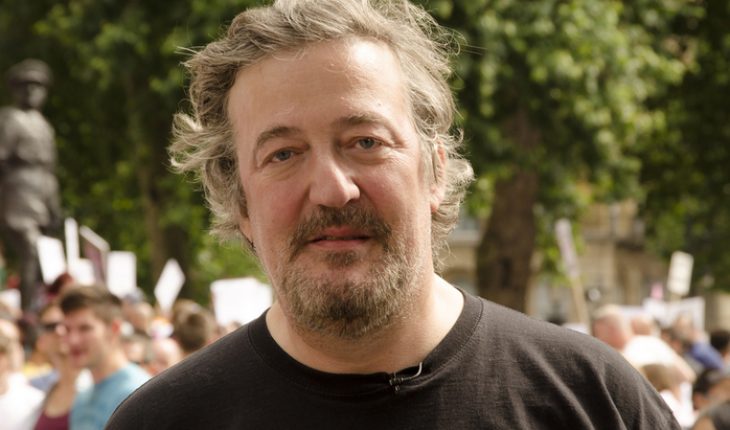Just days after revealing he underwent surgery for prostate cancer, 60-year-old actor and TV presenter Stephen Fry has returned to work. Fry announced that he had his prostate and 11 lymph nodes removed in January after being diagnosed with cancer he describes as an “aggressive little bugger.” Following this he stepped down as presenter of the Bafta film awards last month.
Fry discovered he had prostate cancer during a visit to his GP for a flu jab, but that a full health check revealed his prostate-specific antigen (PSA) levels were high. An MRI scan confirmed that he had cancer.
Fry discovered he had prostate cancer during a visit to his GP for a flu jab, but that a full health check revealed his prostate-specific antigen (PSA) levels were high. An MRI scan confirmed that he had cancer.
His prostate cancer was given a Gleason score – a scale used to measure the aggressiveness of the condition – of nine out of ten before the operation, in which surgeons removed 11 lymph nodes. He was then offered radiotherapy or having his prostate removed and chose to have surgery, as his cancer wasn’t in the early stages.
Fry believes that surgery has saved his life and encourages men to get their PSA levels checked with a doctor as it could also save their lives, as it has his own. Prostate Cancer UK thanked Fry for going public on his personal experience of prostate cancer to raise awareness of the importance of the PSA test. Fry urged men of a certain age not to be shy – to take charge of their health and ask their GP for this test – especially if there is a history of prostate cancer in their family. Men who have a close relative, such as a father, uncle of brother who has had prostate cancer need to be particularly vigilant of their PSA levels and to be screened regularly.
Like Stephen Fry, I was diagnosed with prostate cancer in my 60s, with a Gleason score of around 9 and had a prostatectomy. This was followed up with radiotherapy and hormone treatment and regular blood tests.
Like Stephen Fry, I was diagnosed with prostate cancer in my 60s, with a Gleason score of around 9 and had a prostatectomy. This was followed up with radiotherapy and hormone treatment and regular blood tests.
I had a PSA test after my older brother was diagnosed with the disease, which has previously affected other close family members. Unlike my brother, I am still alive, writing and campaigning for health charities nearly twenty years.
Prostate cancer is the most common cancer which affects men in the UK and an ageing population means that more men are being diagnosed every year. Stephen Fry was one of over 47,000 men in the UK, diagnosed with prostate cancer in the UK this year. Despite the large number of men diagnosed with this condition it is often ignored until in the advanced, less easily treatable stages. Men are often afraid of the consequences of being diagnosed with the disease. They worry that treatment may affect their sex life and leave them incontinent and impotent. However they need to remember that there is no sex, six-foot under in the graveyard.
Although prostate cancer deaths have overtaken those of breast cancer, prostate cancer awareness levels are still low in British men. Symptoms to look out for include getting up at night more frequently to urinate and a weaker flow.
11,000 men die from prostate cancer every year. It mostly affects men over the age of fifty, although cases of younger men have been rising. The reason for this is unknown. Apart from having a close male relative with prostate cancer, rising levels of pollution, red meat, high levels of saturated fats and increasing stress levels may all be contributing factors.
Early screening and diagnosis will result in the chance of effective treatment and a better outlook. Treatment for prostate cancer depends on the stage of the cancer, age and health of the patient.
The STHLM3 test, a blood test developed by Swedish researchers is a possible breakthrough that has been more effective at detecting aggressive cancer than PSA. It analyses more than 200 genetic markers and six protein markers and cross references this with clinical data from the patient including family history. For the time being the PSA test remains a cost-effective method of screening men.
Thankfully Stephen Fry is receiving excellent care and is making a good recovery. He is to be congratulated and thanked for his courage in speaking out about this personal experience.
- Stephen Fry returns to work after prostate cancer surgery - 4th March 2018
- Christmas feasting a heart attack risk - 25th December 2017
- Socialise to ward off dementia - 7th March 2017







